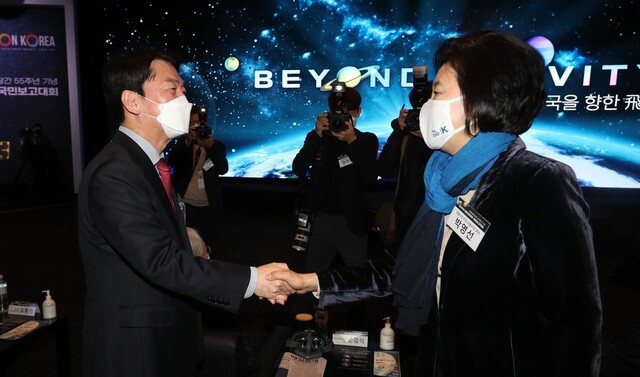Seoul Mayor Park Young-sun and Democratic Party candidate Ahn Chul-soo and National Assembly candidate Ahn Cheol-soo attend the ’30th National Reporting Contest to commemorate the 55th anniversary of the founding of the Daily Economy, held at the Shilla Hotel in Jung-gu, Seoul on the 17th and shake hands. Joint Coverage Photo Group
Lee Nak-yeon, together with Democratic Party Standing Election Committee Chairman Park Young-seon, on the 22nd of the Democratic Party Mayor of Seoul, said, “A candidate with such an attitude to take care of the child with the heart of a mother and to help the elderly with the heart of a daughter.” received. They were both “sexist remarks” and “decent words.” It is an expression that was brought up to “praise” Candidate Park, and some people may wonder why this is sexism. It is not explicit sex discrimination like the expression of “Dalchang” that deceives supporters of President Moon Jae-in, or the remarks of Rep. Cho Su-jin, a member of the power of the people, who compared a female member of the ruling party to a “concubine of the Joseon Dynasty. Whether it’s’mom’ or’daughter’, you might think that it’s okay if you use it in a good way. Maybe Chairman Lee himself is puzzled. In a lecture last July, Chairman Lee said, “The biggest and most touching change in life is the moment a girl turns into a mother. Men are criticized by saying that they don’t get old even when they get older because they don’t experience it. Chairman Lee apologized at the time, saying, “I will look more closely at the changes of the times,” but this time, he made a similar mistake. Experts call this kind of remark “covert sexism.” It means that it is the same sexism, but it is usually in the form of compliments, making it difficult to notice. On the outside, it seems to give preferential treatment to women who have given birth, and to children, but in fact, it is a statement that passes all responsibility for childbirth, childrearing, and care to women. It is building a patriarchal order, praising women for following traditional gender roles. In a situation where fathers are already actively participating in parenting, it is a language habit that is very far behind the times, but it is very common in our politics. The language habit of referring to female politicians as family names is also a problem. Male politicians do not claim to be a’dad-like mayor’ or’Busan’s great son-in-law’, but only female politicians have the words’mother’,’daughter’ and’aunt’. Recently, Candidate Young-seon Park also pledged an eco-friendly free kindergarten meal and said, “I will become a mother-like market.” The Democratic Party’s Supreme Council Member Yang Hyang-ja and Congressman Jin Seon-mi also recently visited Busan and introduced themselves as “Busan’s eldest daughter-in-law.” This may seem like an expression that emphasizes attentiveness and friendliness, but in fact, they are the languages that hold women in a patriarchal order. The same is true of the expression “Ajumma with a Tokyo apartment” used by Ahn Chul-soo, the head of the National Assembly on the 22nd, criticizing Park candidate. The problem with this remark is not only the female derogatory context of the word’Ajumma’ that erases the person’s personal characteristics. Although there is no relationship between what he was trying to criticize and Candidate Park’s gender, Ahn has used a personal title that refers to women to bring down female politicians as if they were emotional and irrational. Kim Eun-ju, head of the Korean Women’s Politics Research Institute, said in a talk with the talks, “We need to know how to explain women’s leadership in the language of democratic values and rational reason, but our politics has never considered this.” “Continue to explain the role of women in traditional family language. You are separating women from public leadership.” Despite the diverse roles of women in our society, it is a kind of’political laziness’ to imagine and express women only as’mother’,’daughter’ and’daughter-in-law’. The fragmentary way of thinking about women is embedded in political language. These verbal habits, consciously or not intentionally, will reproduce our stereotypes. How about contemplating new expressions to describe female politicians before our language controls our thoughts? By Lee Ji-hye, staff reporter
newsletter
Every morning, every Thursday day
A friendly newsletter that will save you from the flood of news.
Meet
